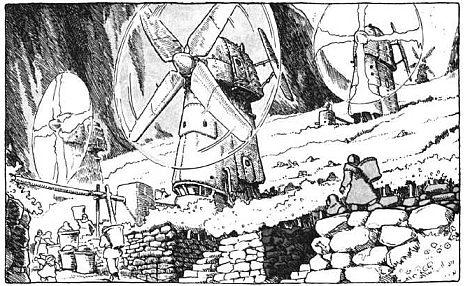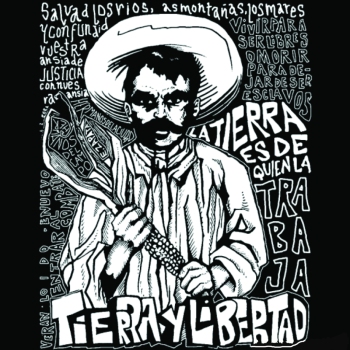
by Rob los Ricos and Paul Cudenec
When asked what he thought about Western civilization, Mohandas Gandhi replied “I think it would be a good idea.”
Western civilization is generally thought to be that of Europe and the British Empire. This is a fallacy which historians and other people of learning have perpetuated for many generations.
Europe once had a thriving civilization. There is evidence of sea-faring trade systems which transported goods from around the world. There is also abundant evidence of building techniques which created structures all but impossible to replicate with 21st century technology. Yet all that remains of this early European civilization are the ruins left behind. What happened? Why did it fail so completely that European people do not retain any knowledge of it?
Invaders from Southwest Asia (Asia Minor, the Middle East) methodically and thoroughly obliterated it, and replaced it with their own: a highly authoritarian, highly patriarchal civilization of plunder, rape, and slaughter.
For centuries, the Roman Catholic Church persecuted people of knowledge. Books not written by the hands of trusted clerics were banned. Book burnings were common spectacles, and anyone with knowledge of healing, or who was literate, or who did not willfully silence themselves, or put themselves into the service of Patriarchal authorities was burned alive or tortured to death, and their bodies put on display to terrify the general public into obedience.
This is the genesis of what is today called Western “civilization,” which produced a society that values ruthlessness over compassion, and ignorant servitude to brutal, heartless institutions over knowledge of, and harmony with, the world as it exists.
Plunder, rape, and slaughter are rewarded with wealth and power. Smarmy-mouthed imbeciles are elevated to positions of leadership. People of learning are tasked with developing technologies and techniques to further control or destroy anything which has lasting value to life on this planet, and to destroy any people standing in the way of this destruction.
The West’s current incarnation as Industrial Capitalism poses a severe and unprecedented threat to the health and wellbeing of the living planet in general and the human species in particular.
The very basis of this system is the so-called need for permanent “economic growth”, involving a theoretically endless increase in the exploitation of people and nature that, logically, can only end in disaster.
This system justifies and defends itself by means of a mesh of oppressive constructs such as “property”, “law” and “nation”, which today largely go unchallenged, even by critics of capitalism’s worse excesses.
General acceptance of these constructs serves to camouflage and legitimize the violence used by the system to impose its control. It thereby helps to criminalize any resistance to this oppressive violence.

In the Mexican revolution of the early part of the 20th century, the Zapatistas had a slogan: “It is better to die on your feet than to live on your knees.”
In the West, the pervasive attitude is currently one of ignorance, fear, and slothful privilege, wherein the suffering caused by Western institutions in far-off lands is not of consequence to the people who are causing it through an unquenchable lust for cheap consumer goods.
Few of the beneficiaries are even aware it is happening, and most wouldn’t care if they knew. If told that wireless technology is causing genocide in central Africa, most Western consumers would likely reply “I like my iphone.” Or their X-box, or their internet-connected refrigerator.
Western consumers have decided that it is – indeed! – much better to live in ignorance and servitude to corporatized, military police states, and to hell with the consequences, rather than do anything to stop campaigns of genocide beyond their field of vision. The products of privilege produced in the process are precious to them, not human lives, or a living planet.
If the society produced in Europe through centuries of bloody violence and subsequently unleashed to ravage the entire planet can be thought of as “civilization,” an intelligent human being can only conclude that this civilization is something which must be eradicated so thoroughly as to never again be obtainable.
If this does not happen, and soon, our planet will become uninhabitable, and life as we know it no longer possible. Something new will evolve in the toxic, ruined wastelands the West creates everywhere. It will not likely be compatible with living things that have been predominant for the past few million years.
To accept the notion that domination of the world by the West is the result of historic “Progress” is to validate genocide against indigenous Peoples.
To refer to this centuries-long, ongoing process of extermination as “progress” is racist. It is the fundamental foundation of White Supremacy. Acceptance of this ideology discards the notion that human beings belong to the Earth and must dwell here with respect, and to live in harmony with the bounty available in the places we dwell. To do so, the life and life-giving aspects of the land must not be over-exploited or destroyed in the process of resource extraction.
This is most evident in the fact that every nation-state where indigenous Peoples still retain traditions and knowledge of how to dwell in harmony with the Earth and the abundance which it provides, the indigenous Peoples are still being exterminated – to this day. Despite the many international laws designed to “protect” indigenous Peoples from settler violence, and to protect the Earth.
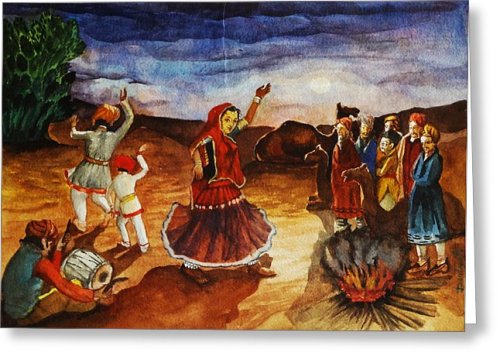
To live within the abundance the Earth has to offer, and not fuck it up so badly that future generations will not inherit it, requires something the West has no regard for: wisdom.
The idea of a humanity living largely in harmony with nature, in communities founded on mutual aid and co-operation, is not an idle daydream but a real possibility (a possibility that has been realized numerous times, across the world, by people who consider themselves to belong to the places where they dwell).
The industrial capitalist system depends for its survival on a complex web of often-unconscious personal attitudes which normalize and facilitate adaptation to its unhealthy structures of domination and exploitation – examples of these attitudes being sexism, racism, nationalism and the division of human beings into so-called social classes.
In view of all this, it is clear that no mere reform of this system, leaving intact the underlying basis, constructs and attitudes of the industrial capitalist system, will achieve the liberation we desire. A complete destruction, or dismantling, of the entire industrial capitalist system is therefore necessary.
Since no system of privilege and power destroys or dismantles itself voluntarily, a degree of confrontation will inevitably be involved in its removal.
It is important to remember, however, that this confrontation is not an end itself but merely a means to an end.
It is also important to remember that our desire for the destruction of the current system is not nihilistic in motivation, but is born of a yearning for another way of living.

This possible way of living has been denied us not only by the physical violence of the system, which has uprooted us from the soil, imprisoned and isolated us in its machineries of exploitation, but by its psychological violence.
This psychological violence involves the destruction of human dignity and freedom by a process of separation and disempowerment.
Human beings are taught that they are apart from the natural world, which is something to be feared, mastered or exploited. Individuals are further taught that they are apart from all other individuals and that there is no such thing as community and therefore no possibility of societies based on mutual aid and co-operation.
Disempowerment is amplified by the use of constructs of authority, whether in the form of a god, a king or a state and the idea of obtainable wealth for all. People are indoctrinated to believe that their lives depend on their obedience to these authoritarian ideals, that the authorities have everyone’s best interests at heart and that anyone who challenges the legitimacy of these ideals is therefore a threat to all, rather than to the authorities in question.
The first step in overcoming the power of these systems is to reverse the disempowerment and separation which disables any meaningful resistance.
A sense of belonging to community, to nature and to the cosmos was for many thousands of years the bedrock of human psychology and it still survives outside the concrete confines of modern industrial dogma.

In seeking a solid basis for resistance to industrial capitalism, we could look to indigenous cultures for inspiration, as well as to metaphysical currents and heresies that have kept this alternative vision flowing under the surface of Western society, to eco-feminist and deep green philosophy, and to anticapitalist romanticism.
At the heart of all these traditions is the rejection of external divinity or authority in favour of a self-empowerment which begins from within each individual to embrace a holistic sense of belonging to the social organism, the planetary organism and the cosmos.
This deep empowerment and connection combines perfectly with a radical rejection of all the constructs of power mentioned above – from the lies of “law” and “state” to the mental shackles imposed by patriarchal and racist assumptions.
It would strengthen our collective capacity to conduct a pro-active battle against the system and its physical and psychological infrastructures.
Furthermore, we welcome practical initiatives that reject continued existence within the toxicity of the industrial capitalist system in favour of the development of autonomous communities close to the land and informed by practices such as permaculture and simple living.
Our subsequent resistance to the system’s inevitable attempts to bring them back under its control would thus be firmly based on the defense of another way of living, on the defense of real space and real land, rather than on merely symbolic confrontation.
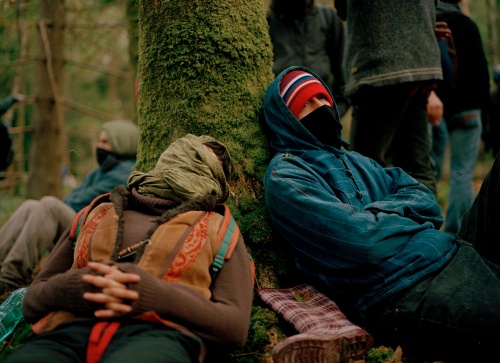
Justice would clearly be seen to be on our side and the resonance of our struggle would attract increasing numbers of people. If they, in turn, launched similar projects with the same underlying sense of empowerment, the system would be unable to cope and the cracks in its supremacy would start to spread.
It is not important that everyone in active resistance to the domination of the West and its civilization of mass destruction be in agreement in their critiques, in their approach to destroying the power Western institutions have over our lives, or in their end goals.
What is important is that the resistance dismantles the systems of oppression and domination used to keep us in servitude to them.
We have no crystal balls or other tools and methods to foresee the future. We do not know which tactics and methods will work best in which places. Therefore, a multitude of approaches will produce a multitude of results, some more effective, some less. The important aspect is that resistance is what we do with our lives, rather than replicating the domination of ourselves and our world through our daily activities: daily activities which are in place to keep us within the parameters set by oppressive institutions of wealth and power.
There will be vast campaigns of propaganda by the privileged elite. They own the mass media. They are over-represented on social media. Our families, friends, lovers, neighbors will often take the path of least resistance in order to live comfortably within the parameters set by the systems of wealth and privilege currently in power. In order to resist this, we must create a culture of resistance.
A culture of resistance would include feasts, dances, and celebrations, as well as on-going campaigns of counter-propaganda and sustained attacks against the institutions of privilege, power, and wealth.
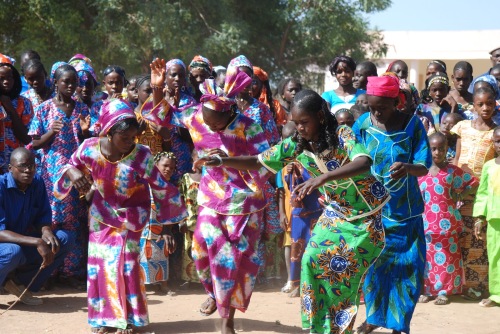
Establishing a culture based on values in direct conflict with those of the West will take time, and will need to be created both underground and in plain sight. Guerrilla forces in past movements were invisible to the federal or colonial forces fighting them. In many instances, it took decades for them to realize that the guerrillas were everywhere, and damn near everyone.
Much of the structures needed to create such a movement in the West are already in place, but need to be pushed into more radical, more confrontational directions.
A culture of sharing should be the common denominator of all resistance movements. Starving people do not have the strength to fight.
We must expend great effort to see to the well-being of our comrades. Few people want to be either martyrs or live monastic lives of self-denial. In order to encourage people to overcome their ingrained alienation from each other and the world we inhabit, we need to embrace one another with new-found passion. We must revel in one another’s joy, and comfort those who are troubled.
The psychological and emotional damage done to most of us by the institutions of power and domination must be healed. Many healing methods will be required, and some amount of patience as well.
The earth has not been damaged beyond repair. We can help it to heal as well. Humans are clever and adaptable beings. Collectively, we can accomplish any task we set for ourselves.
It may take several generations for us to overcome the current systems of privilege, power, and domination afflicting us and destroying our homeworld. It took 1000 years for the systems of oppression to develop and spread throughout the world like a malignant cancer.
We can act to surgically remove the cancer and develop healthier lifestyles to make sure it doesn’t recur.
There is no reason to think that this has not happened before in the long history of human beings. Some indigenous peoples retain stories of such times in their oral histories. We should listen to them.
There is nothing to be gained by continuing to devote our lives to obtaining money through subservience to wealth and power.
The earth will survive and life will continue to evolve, with us or without us. Our mother earth is willing to embrace us, and teach us all we need to know in order to live here with love and respect for the life she provides.
It is up to us to return to her guidance and reciprocate her love.
reposted from Winter Oak.
This collaborative article was written with the desire of sparking a wider conversation. Please feel free to post comments here or via winteroak@greenmail.net





















